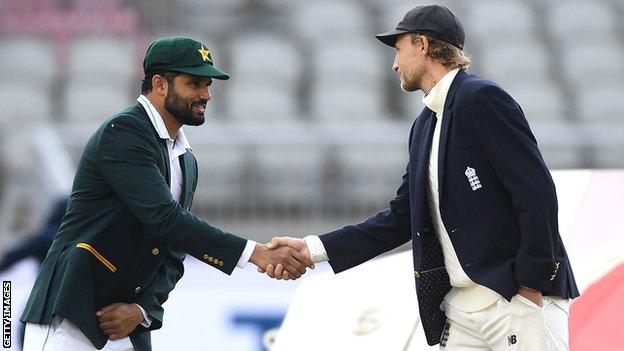England should tour Pakistan, says ECB chairman Ian Watmore
- Published

England should "definitely" tour Pakistan if it is safe to do so, according to new England and Wales Cricket Board chairman Ian Watmore.
Pakistan did not host Test cricket for 10 years following an attack by gunmen on the Sri Lanka team in 2009.
England's next tour of Pakistan is set for 2022, their two prior tours were played in the United Arab Emirates.
"It would be brilliant for us and for the game there to get cricket back on," said Watmore.
"With Pakistan back hosting cricket we should definitely go and tour there if it's at all safe to do so."
Pakistan have taken part in a tour of England this summer against the backdrop of the coronavirus pandemic.
The tourists have stayed, played and trained in a bio-secure bubble, with the three Tests and three Twenty20 matches, the last of which is on Tuesday at Emirates Old Trafford, all held behind closed doors.
England have not toured Pakistan since 2005. International limited-overs cricket returned to the country in 2015 and has steadily grown to the point that both Sri Lanka and Bangladesh have played Test cricket there in the past year.
English players have also taken part in the Pakistan Super League.
In August, Pakistan Cricket Board chairman Ehsan Mani said that England's next tour of Pakistan would not take place at neutral venues.
"I don't think there will be any reason for England not to come," said Mani. "I'm very clear that we won't play in third countries. We either play in Pakistan or we won't play."
In a wide-ranging media conference on his first day in his new role, Watmore also discussed:
the financial problems facing the ECB as a result of the coronavirus pandemic
his views on The Hundred
the future of the domestic game and the 18 first-class counties
the lack of diversity on the ECB board
Watmore, 62, has had a career in business and the civil service, as well as previously serving as the chief executive of the Football Association. He is the father of former Sunderland striker Duncan Watmore.
He takes over as ECB chairman from Colin Graves at a time when the game is dealing with the impact of coronavirus, and the governing body facing a £100m shortfall.
Watmore says that is his "most urgent" issue, with job cuts "inevitable".
Graves had stayed on for an extra year to oversee the launch of The Hundred, only for the new competition to be postponed because of the pandemic.
Watmore conceded "there are a lot of people still to be convinced" on the new format, but reiterated its value for bringing a new audience to the game and strengthening women's cricket.
"I'm a passionate believer in all forms of cricket," he said. "It is the best form of sport. I don't see The Hundred as something that needs to be in conflict with all the others."
The truncated domestic season of 2020 has seen the formation of the Bob Willis Trophy, where the 18 first-class counties have been split into groups of three and are vying for a place in a five-day final at Lord's.
There is now debate over whether that format should be retained in future in favour of the current promotion-and-relegation system over two divisions.
Watmore said that the structure of the 2021 domestic season is "up for grabs", but that he believes all 18 counties can survive across multiple formats of the game.
"Counties should be aspiring to play all forms of cricket, developing England players of the future, but also each of them developing a nuanced localised strategy," he said.
"Each county can play its part in the future of English cricket in addition to playing in the core tournaments.
"If the economics and performance standards don't allow that, or the individual counties decide they want to do something different, then that is a conversation, but it is not where I'm coming from as I come into this job."
Watmore also addressed the diversity of the ECB board, which is now entirely made up of white members following the retirement of Lord Kamlesh Patel.
"It's quite clear that we do not have the diversity of board that we need going forward," he said.
"Our gender balance is strong, but could be better. With Kamlesh stepping down, we revert to being an all-white board and that is not acceptable in the long run. We very much we want a diverse, inclusive board."